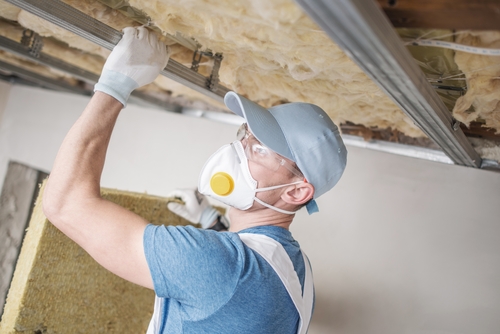Written on: May 15, 2022
 With energy prices so high and inflation rates draining cash from our pockets every day, most Mainers want to save money at home wherever they can.
With energy prices so high and inflation rates draining cash from our pockets every day, most Mainers want to save money at home wherever they can.
Here’s an idea: concentrate on air sealing and insulating your home right now. The EPA estimates that homeowners can save an average of 15% on heating and cooling costs by air sealing their homes and adding insulation in attics, floors over crawl spaces, and accessible basement rim joists. Read more.
Let’s focus on insulation. Did you know that most homes are under-insulated? Adding enough to meet recommended R-values is one of the most cost-effective ways to improve your home’s overall efficiency and comfort. You can take a deeper dive into insulation techniques here.
To get started, here are some tips to help make sure your home is adequately insulated.
Besides reducing energy costs, a properly insulated foundation will keep below-grade rooms more comfortable and prevent moisture problems, insect infestation, and radon infiltration.
Loose-fill or batt insulation is typically installed in an attic. Loose-fill insulation is usually less expensive to install than batt insulation and provides better coverage when installed properly.
If the ducts in your home are in an unheated or non-air-conditioned space, be sure that they are well sealed and insulated. Have the condition of your ductwork checked periodically so you can head off energy waste.
Properly insulating your cathedral ceilings will allow ceiling temperatures to remain closer to room temperatures, providing an even distribution throughout your house.
Cathedral ceilings must provide space between the roof deck and home’s ceiling for adequate insulation and ventilation. This can be achieved through the use of truss joists, scissor truss framing or sufficiently large rafters.
It’s always a good idea to insulate part, if not all, of your basement. A properly insulated basement can save you money on energy and provide dry, comfortable extra living space. You should install insulation in the basement ceiling, sealing off any foundation leaks, insulating rim joists and sill plates, which are major sources of heat loss in many homes.
Additionally, you should seal around electrical outlets and any exterior venting to eliminate drafts and cold spots. If you are considering finishing your basement to create extra livable space, be sure to insulate the walls and the floor for extra comfort.
When you’re insulating floors above unheated or uncooled garages, all possible sources of air leakage should be sealed first. This has the added benefit of minimizing the danger of contaminants (from car exhaust, paint, solvents, gardening supplies, etc.) in the garage migrating into the conditioned space.
We hope the above suggestions are useful in maintaining an affordable higher level of comfort in your home. Please visit this page to read more energy-saving money tips.